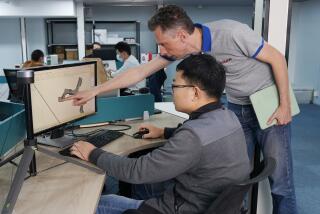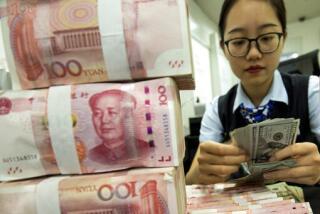China Steps Up Foreign Investment : Overseas Projects Range From Gold Mining to Farming
- Share via
BEIJING — China announced on Tuesday a big increase in investment abroad and said it was discussing joint investment with the Soviet Union and other East European countries.
The Economic Daily reported that in 1987 China set up 124 firms overseas with a total capital of $1.3 billion, of which China’s share was $350 million.
The projects range from a gold mine and aluminium smelter in Australia to railways, housing estates and bridges in the Middle East and North Africa and financing for the Channel Tunnel between Britain and France.
The most unusual overseas scheme reported in the official press is a farm in the Australian state of Victoria to be run by a firm from Jiangsu collectively owned by peasants, which will sell fish, oranges, apples and vegetables to consumers in Melbourne.
China started such investment in 1979 and by the end of last year had set up 385 firms with total capital of $1.78 billion in 67 countries and regions.
Peking says foreign investment is vital to its strategy of joining the world economy and making up for years lost during political campaigns inside the country.
The Economic Daily said China was discussing joint investments with the Soviet Union and countries in East Europe and with nations with which it has no diplomatic relations.
In an accompanying editorial, the newspaper said investment abroad was extremely important for opening up China to the outside and taking part in the international economic system.
This is a line advocated repeatedly since January by Communist Party chief Zhao Ziyang, who urges a more aggressive role for the country’s coastal areas, home to 200 million people, in the world economy.
Zhao argues that China does not have enough capital to modernize these areas on its own and must attract it from abroad through labor-intensive industries that are being abandoned not only by the West but also by Taiwan, South Korea and Singapore.
“Opportunities to develop the areas have been missed in the past,” Zhao said. “We cannot allow ourselves to miss this chance again. We should have a sense of urgency.”
The Economic Daily said investment abroad was needed to further penetrate world markets, earn foreign exchange, obtain goods and raw materials that China has to import and improve the level of the nation’s technology and manpower.
It said nearly 90% of the overseas projects set up last year were in developing countries, a reflection of China’s still low technological level. The publication added that this trend would continue in the near future.
More to Read
Sign up for Essential California
The most important California stories and recommendations in your inbox every morning.
You may occasionally receive promotional content from the Los Angeles Times.













